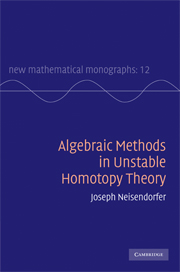Book contents
- Frontmatter
- Contents
- Preface
- Acknowledgments
- Introduction to unstable homotopy theory
- 1 Homotopy groups with coefficients
- 2 A general theory of localization
- 3 Fibre extensions of squares and the Peterson–Stein formula
- 4 Hilton–Hopf invariants and the EHP sequence
- 5 James–Hopf invariants and Toda–Hopf invariants
- 6 Samelson products
- 7 Bockstein spectral sequences
- 8 Lie algebras and universal enveloping algebras
- 9 Applications of graded Lie algebras
- 10 Differential homological algebra
- 11 Odd primary exponent theorems
- 12 Differential homological algebra of classifying spaces
- Bibliography
- Index
7 - Bockstein spectral sequences
Published online by Cambridge University Press: 03 May 2010
- Frontmatter
- Contents
- Preface
- Acknowledgments
- Introduction to unstable homotopy theory
- 1 Homotopy groups with coefficients
- 2 A general theory of localization
- 3 Fibre extensions of squares and the Peterson–Stein formula
- 4 Hilton–Hopf invariants and the EHP sequence
- 5 James–Hopf invariants and Toda–Hopf invariants
- 6 Samelson products
- 7 Bockstein spectral sequences
- 8 Lie algebras and universal enveloping algebras
- 9 Applications of graded Lie algebras
- 10 Differential homological algebra
- 11 Odd primary exponent theorems
- 12 Differential homological algebra of classifying spaces
- Bibliography
- Index
Summary
This chapter begins with an exposition of exact couples which follows the presentation in MacLane's Homology. The important feature of MacLane's exposition is that it stresses the explicit identification of the r-th term of the spectral sequence. We specialize to the case of the homotopy Bockstein exact couple and blend this treatment of spectral sequences by exact couples with a treatment which is a simplification of that of Cartan–Eilenberg via spectral systems or H(p,q) systems. Cartan–Eilenberg gives an alternative description of the r-th term of the Bockstein spectral sequence. In particular, this alternate description is well suited for the introduction of Samelson products into the spectral sequence.
We determine the convergence of the mod p homotopy Bockstein spectral sequence, at least in the case where the classical homotopy groups have p-torsion of bounded order. From general principles it is clear that the E∞ term should be a function of the homotopy groups of the p-completion, but an example shows that there are significant difficulties in the case when the p-torsion is of unbounded order.
But the principal application of the Bockstein spectral sequence is not to compute the E∞ term. There are usually better ways to do that. Application of the Bockstein spectral sequence comes from its differentials. The differentials determine the torsion in the integral homotopy groups. In addition, there is a strong connection between differentials and the problem of extending maps which originate on a Moore space.
- Type
- Chapter
- Information
- Algebraic Methods in Unstable Homotopy Theory , pp. 221 - 250Publisher: Cambridge University PressPrint publication year: 2010



